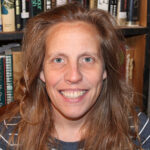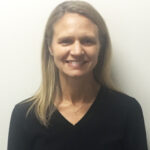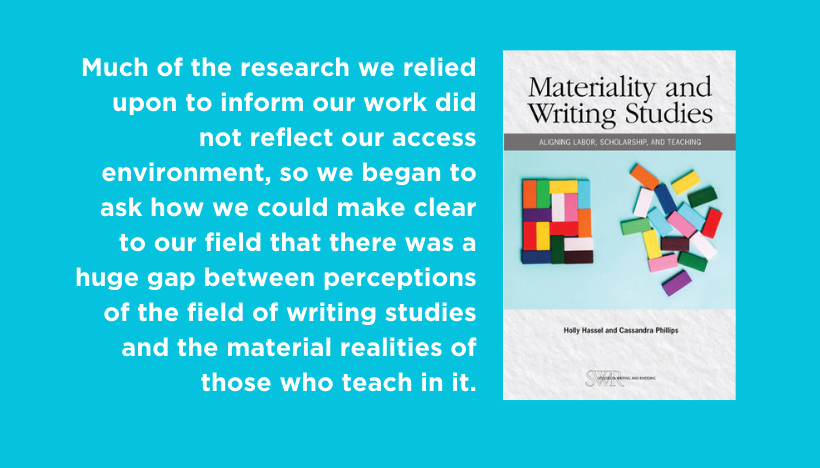This post was written by NCTE members Holly Hassel and Cassie Phillips.
We are excited that Materiality and Writing Studies: Aligning Labor, Teaching, and Scholarship (2022) is now available from the CCCC Studies in Writing & Rhetoric (SWR) series. We have been working on this project for nearly five years, starting when we were both mid-career professors at the former University of Wisconsin Colleges, the two-year college system for the state of Wisconsin. The mission of the UW Colleges was to realize the “Wisconsin Idea,” bringing the resources of the UW System all throughout the state. Our campuses were intended to be accessible bridges to the larger UW campuses, and our open admissions made us an avenue for students trying out college and who wanted an affordable, local, accessible option for pursuing their postsecondary educational goals.
We wrote this book because we spent many years looking for ways to establish an effective writing program and improve our teaching.
We found that there were few resources that reflected the material realities and the needs of our students and our instructors. In addition, much of the research we relied upon to inform our work did not reflect our access environment, so we began to ask how we could make clear to our field that there was a huge gap between perceptions of the field of writing studies and the material realities of those who teach in it.
The result is this book project—the four chapters in the book focus on making connections between the areas that make up the field of writing studies: material conditions (the job market, employment prospects, and labor); scholarship (the research published in several major writing studies journals over a nearly 20-year period); and teaching (drawing from a multi-year study of students in a series of developmental and first-year reading and writing courses in campuses across the state). Strategically establishing a network across these three areas, our fourth chapter seeks to make recommendations that will bring those often disparate areas into alignment for the benefit of students, teachers, programs, and professional associations.
We think Materiality and Writing Studies will be of interest to a lot of different kinds of readers. For graduate students, the book will provide insights into areas of the field that can only be seen through years of experience and systematic examination. In essence, MWS is a snapshot or quick start guide to understanding labor trends in the field (including the kinds of positions that most instructors work in), into a history of scholarship across several major writing studies journals, and a deep look at the students at open-access institutions and their literacy needs. Readers who are just entering the field will find this book gives them a different picture, perhaps, than ones they have encountered in their graduate-degree granting institution.
Readers who are new to two-year colleges or access institutions, as well, whether in instructor positions or leadership roles, may find there are new insights to be gained about the experiences of students in their writing and reading classrooms. What we and others experienced moving from a university setting to an open-admissions two-year college setting was a learning curve, one that required us to re-set what we thought we knew about college writing programs, courses, and students. MWS can be part of helping new instructors bridge the gap between their prior teaching experiences and the distinct environments of two-year college writing and reading programs in the first-year of college which are more expansive, more diverse, and more complex than university writing programs.
For faculty at universities, particularly those with graduate programs, we hope that the book fills the gap that we had experienced (and that we document) between the training that is provided to new graduate student teachers and the working environment at institutions that are dissimilar to those research-intensive and graduate-program campuses. MWS will give readers a wide picture of what a career as a writing teacher looks like. We wrote this book because we want research-focused faculty in writing studies to be inspired to look critically at their own curriculums, and at their own writing and research projects.
As we document in the book, there is a wide gap between the scholarship published in major journals that aligns with/meets the needs of teachers in the lower division and those who teach at open-access/two-year colleges where the primary work is helping students transition to college literacies.
This is different work, categorically, than teaching at a selective university with well-prepared students whose intentions were always to go away to college. Materiality and Writing Studies is a book that can be part of understanding a fuller picture of college writers today.
 Holly Hassel is a professor of English and director of first-year writing at North Dakota State University in Fargo, North Dakota. She graduated with her PhD from the University of Nebraska-Lincoln in 2002 and taught for 16 years at the University of Wisconsin-Marathon County, a two-year campus of the state-wide institution, University of Wisconsin Colleges. She is past editor of Teaching English in the Two-Year College (2016-2020). Since 1996, she has primarily taught first-year writing. She currently serves as chair of the Conference on College Composition and Communication.
Holly Hassel is a professor of English and director of first-year writing at North Dakota State University in Fargo, North Dakota. She graduated with her PhD from the University of Nebraska-Lincoln in 2002 and taught for 16 years at the University of Wisconsin-Marathon County, a two-year campus of the state-wide institution, University of Wisconsin Colleges. She is past editor of Teaching English in the Two-Year College (2016-2020). Since 1996, she has primarily taught first-year writing. She currently serves as chair of the Conference on College Composition and Communication.
 Cassie Phillips is a professor of English at the University of Wisconsin-Milwaukee at Waukesha. She also serves as the writing program and developmental English coordinator for the College of General Studies at the University of Wisconsin-Milwaukee. She graduated with her PhD from the University of Louisville in 2000, and has since been working for the UW System, primarily focused on first-year and developmental writing.
Cassie Phillips is a professor of English at the University of Wisconsin-Milwaukee at Waukesha. She also serves as the writing program and developmental English coordinator for the College of General Studies at the University of Wisconsin-Milwaukee. She graduated with her PhD from the University of Louisville in 2000, and has since been working for the UW System, primarily focused on first-year and developmental writing.
It is the policy of NCTE in all publications, including the Literacy & NCTE blog, to provide a forum for the open discussion of ideas concerning the content and the teaching of English and the language arts. Publicity accorded to any particular point of view does not imply endorsement by the Executive Committee, the Board of Directors, the staff, or the membership at large, except in announcements of policy, where such endorsement is clearly specified.

